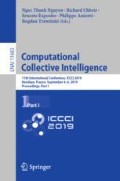Abstract
Most of the information is available in the form of unstructured textual documents due to the growth of information sources (the Web for example). In this respect, to extract a set of events from texts written in natural language in the management change event, we have been introduced an open information extraction (OIE) system. For instance, in the management change event, a PERSON might be either the new coming person to the company or the leaving one. As a result, the Adaptive CRF approach (A-CRF) [15] has shown good performance results. However, it requires a lot of expert intervention during the construction of classifiers, which is time consuming. To palpate such a downside, we introduce an approach that reduces the expert intervention during the relation extraction. The named entity recognition and the reasoning which are automatic and based on techniques of adaptation and correspondence. Carried out experiments show the encouraging results of the main approaches of the literature.
Access this chapter
Tax calculation will be finalised at checkout
Purchases are for personal use only
Notes
- 1.
- 2.
- 3.
The OLLIE tool is available at this address: https://github.com/knowitall/ollie.
- 4.
References
Grishman, R., Sundheim, B.: Message understanding conference-6: a brief history. In: Proceedings of the 16th Conference on Computational linguistics, pp. 466–471 (1996)
Talha, M., Boulaknadel, S., Aboutajdine, D.: Système de Reconnaissance des Entités Nommées Amazighes, In: actes de TALN, pp. 517–524 (2014)
Elloumi, S., Jaoua, A., et al.: General learning approach for event extraction: case of management change event. J. Inf. Sci. 39(2), 211–224 (2013)
Fader, A., Soderland, S., Etzioni, O.: Identifying relations for open information extraction. In: Proceedings of the Conference on Empirical Methods in Natural Language Processing, pp. 1535–1545 (2011)
Corro, L.D., Gemulla, R.: ClausIE: clause-based open information extraction. In: Proceedings of the 22nd Intlligence Conference on World Wide Web, pp. 355–366 (2013)
Banko, M., Cafarella, M.J., Soderland, S., Broadhead, M., Etzioni, O.: Open information extraction from the web. In: Proceedings of the 20th IJCAI 2007, pp. 2670–2676 (2007)
Wu, F., Weld, D.S.: Open information extraction using wikipedia. In: Proceedings of the 48th Annual Meeting of ACL 2010, pp. 118–127 (2010)
Vo, D.-T., Bagheri, E.: Open Information Extraction, pp. 1–6 (2016)
Shaalan, K., Raza, H.: NERA: named entity recognition for arabic. J. Am. Soc. Inform. Sci. Technol. 60(8), 1652–1663 (2009)
Benajiba, Y., Diab, M., Rosso, P.: Using language independent and language specific features to enhance arabic named entity recognition. Int. Arab J. Inf. Technol. 6(5), 464–473 (2009)
Hearst, M.A.: Automatic acquisition of hyponyms from large text corpora. In: Proceedings of the 14th Conference on Computational Linguistics COLING 1992, pp. 539–545 (1992)
Berland, M., Charniak, E.: Finding parts in very large corpora. In: Proceedings of the 37th Annual Meeting of the Association for Computational Linguistics on Computational Linguistics, pp. 57–64 (1999)
Elloumi, S.: An adaptive model for sequential labeling systems. Multimedia Tools and Applications (2019). https://doi.org/10.1007/s11042-019-7558-8. ISSN: 1573-7721
Sarawagi, S., Cohen, W.: Semi-Markov Conditional Random Fields for Information Extraction. pp. 1–8 (2004)
Serrano, L., et al.: Vers un système de capitalisation des connaissances: extraction d’événements par combinaison de plusieurs approches, pp. 1–14 (2012)
Kodelja, D., Besancon, R., Ferret, O.: Représentations et modèles en extraction d’événements supervisée, CEA, LIST, France, pp. 1–7 (2017)
Acknowledgment
This work was made possible thanks to the Astra funding program Grant 2014-2020.4.01.16-032.
Author information
Authors and Affiliations
Corresponding authors
Editor information
Editors and Affiliations
Rights and permissions
Copyright information
© 2019 Springer Nature Switzerland AG
About this paper
Cite this paper
Sahnoun, S., Elloumi, S., Yahia, S.B. (2019). Event Detection Based on Open Information Extraction and Ontology. In: Nguyen, N., Chbeir, R., Exposito, E., Aniorté, P., Trawiński, B. (eds) Computational Collective Intelligence. ICCCI 2019. Lecture Notes in Computer Science(), vol 11683. Springer, Cham. https://doi.org/10.1007/978-3-030-28377-3_20
Download citation
DOI: https://doi.org/10.1007/978-3-030-28377-3_20
Published:
Publisher Name: Springer, Cham
Print ISBN: 978-3-030-28376-6
Online ISBN: 978-3-030-28377-3
eBook Packages: Computer ScienceComputer Science (R0)

